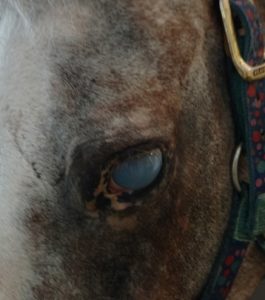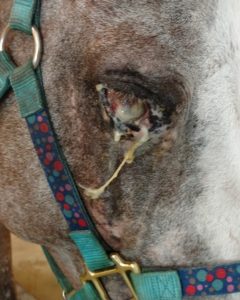Tuesdays with Tony
As we get into the Christmas spirit, it seems horses can sense the strain on your wallet from all that shopping. As a cat I’m a little more conscientious about such things, of course, but horses get some sort of evil pleasure from making their owners squirm.
 Every Eye Injury is an Emergency
Every Eye Injury is an Emergency
If you are a horse, one easy way to rack up a big vet bill in a short amount of time is by poking something in your eye. Remember that eye injuries are always an emergency, and the more time that passes before the right medication is initiated, the more expensive they can be to treat.
Corneal Ulcer
This is the most common eye injury in horses, but it can be just the tip of the iceberg. The cornea is the clear outermost layer of the eye that you see through. Puncture wounds, abrasions, and other forms of trauma can cause a break in this layer. Usually these “simple” ulcers will heal just with a few days of triple antibiotic ointment. However, any break in this protective outer layer creates the opportunity for infection. Uh-oh.
Stromal Abscess
When a corneal ulcer gets infected by any of the bacteria or fungus that exists in our lovely Florida soil, it becomes a ‘complicated’ ulcer. What often happens at this stage is the outer layer of cornea heals over, trapping the infection beneath. This is called a stromal abscess, which takes on average 8 weeks of medicating the eye 4 times a day to heal! No fun. A Stromal abscess can often be prevented by early treatment of a Corneal Ulcer. That’s why all eye injuries are an emergency! That, and….
 Iris Prolapse
Iris Prolapse
Certain types of fungus that can infect corneal ulcers actually cause the cornea to ‘melt.’ The fancy medical term for this is keratomalacia, which would be great to use in a game of Scrabble! Melting corneal ulcers are the worst of the worst. If left untreated, they can cause iris prolapse, or rupture of the eye. It is every bit as gross as it sounds. Basically, the ooey gooey insides of the eye leak out through the hole in the cornea, until the iris (the part that gives the eye it’s color) blocks the hole. This requires emergency conjunctival graft surgery or enucleation (removal of the eye) to treat. This is definitely not something you want to make your horse endure due to your inaction.
An Ounce of Prevention
You can’t really protect your horse 100% from everything, because they’re a lot like cats in their ability to find a way to cause mischief. However, you can go a long way towards preventing eye injuries (injuries in general, really) by doing a few simple things. First, make sure they don’t have something sharp to scratch on. Check your stalls and fences regularly for nails and broken boards. Broken tree branches are another favorite scratching point. Also, don’t put your horses out with things like rusted-out car bodies, tractor implements, falling-down structures, and things like that. Just because your neighbor’s horse made it in that type of environment for 20 years is no guarantee that yours will.
A quality fly mask can also prevent many eye injuries. Gnats and flies are a major cause of itchy eyes, so keeping them away is a huge help. The mask itself will also keep most scratching sessions from becoming eye injuries. It’s a lot cheaper to buy a new fly mask every year than it is to treat an eye injury. Do your horse (and yourself) a favor, and cover it up!
The moral of the story
If your horse has a squinty, tearing, swollen, or otherwise weird-looking eye, don’t waste any time getting one of our amazing docs to check it out! Quick treatment can make a huge difference in whether or not your horse loses an eye, and it can also be the difference between hundreds of dollars and thousands of dollars. I’m a professional risk-taking cat, and I’m here to tell you: Don’t take risks with your horse’s eyes! There’s nothing to gain, and everything to lose.
Until next week,
-Tony
Tuesdays with Tony is the official blog of Tony the Clinic Cat at Springhill Equine Veterinary Clinic in Newberry, Florida. If you liked this blog, please subscribe below, and share it with your friends on social media! For more information, please call us at (352) 472-1620, visit our website at SpringhillEquine.com, or follow us on Facebook!
[jetpack_subscription_form title="Subscribe to Whinny's Wisdoms"]
